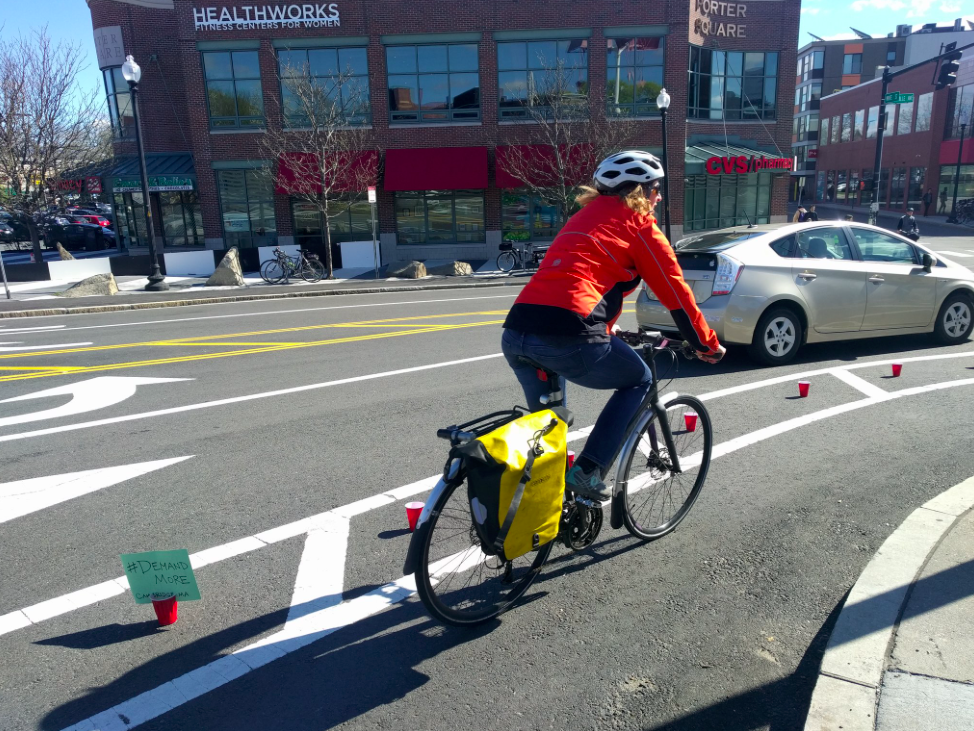A small city in Massachusetts may have just pointed the way for the Big Apple to finally vanquish bike lane opponents who hold too much sway over city officials willing to sacrifice street safety to some vague notion of community consensus.
The Boston-area city of Cambridge just passed the “Cycling Safety Ordinance,” which requires the city of 115,000 to install barrier-protected bike lanes whenever a street is upgraded. The ordinance allows the city to bypass community pushback by mandating the life-saving road improvements even if a community objects — something that has stalled much-needed bike lanes and other street redesigns from coming to fruition here.
New York City has a similar bill — the Vision Zero Street Design Standard — which has the support of a veto-proof majority of City Council members. But it remains stalled because it lacks the support of Mayor de Blasio, who has preferred a piecemeal approach — overruling community boards when he wants, but deferring to them when he doesn't want to rock the boat.
That's where Cambridge comes in. Streetsblog spoke with Mayor Marc McGovern about the city's pioneering bill and how it can show the way forward for good urban planning and less NIMBYism from community boards:
Streetsblog: What was the catalyst for the ordinance?
Mayor Marc McGovern: There has been a lot of conversation over the last handful of years about how we improve bike safety in the city. There were a number of deaths the past few years, cyclists that have been hit, and it increased the urgency. There was still a lot of opposition from certain folks in the city who don't really feel that dedicated bike lanes are helpful.
Streetsblog: What’s the city’s general attitude towards cycling and bike lanes before this ordinance?
McGovern: A lot of people are moving into Cambridge who are younger, want to bike, and don’t own cars. It shifted, not just the politics shifted, but a lot of conversations about how important bike lanes are. There are a whole bunch of people who have lived in the city for a long time who don’t ride bikes and don't see the value of bike lanes, who feel, "We’re losing control of our city, and who are these new people moving in and telling us what to do." Bike lanes are really symbolic of that.
Streetsblog: Why do elected officials feel the need to listen to uninformed, non-professional resident groups that are so disconnected from the new residents who actually live in these communities?
McGovern: It is our job as elected officials to listen to all groups and all sides of an issue and then make the most informed and best decision possible for our city. Cambridge is a changing community with many families who have lived here for generations and many new residents. We need to listen to all of them.
Streetsblog: Can the bill help cities function on a basic level?
McGovern: If you mean “function” in terms of helping people to get around the city safely, then yes. I think separated bike lanes are safer for all modes of transportation and if people feel safer because of these lanes, then we can get more people out of their cars, which will help with traffic.
Streetsblog: How have communities responded to bike lane proposals in the past?
McGovern: It was often controversial. The conversation was, “Will we or won’t we install a bike lane?” What we’re moving to is, "We are going to [build a bike lane]. The question is now, 'How do we do it, and how do we minimize negative impacts?'" ... [The new law] took that ambiguity off the table so now people know, “Yes we're doing it. Stop arguing, 'Will we/won't we?' and start having conversations about how do we most effectively."
Streetsblog: What steps did you take to make this ordinance happen?
McGovern: The city made commitments to do Vision Zero. We created a bike networking plan of dedicated bike lanes so people can get around the city more safely. What we did was we said, “Let’s bring in folks from the bike community to sit at a table with city leaders, let's all sit down at the same table talk about, hash it out.” Which we did probably a year worth of meetings to come up with the ordinance that everyone felt good about. When redesigning streets that are part of the bike network, we committed to putting in bike lanes — finally making that a promise and would follow through. Everybody walked away and felt good, got something out of the ordinance.






